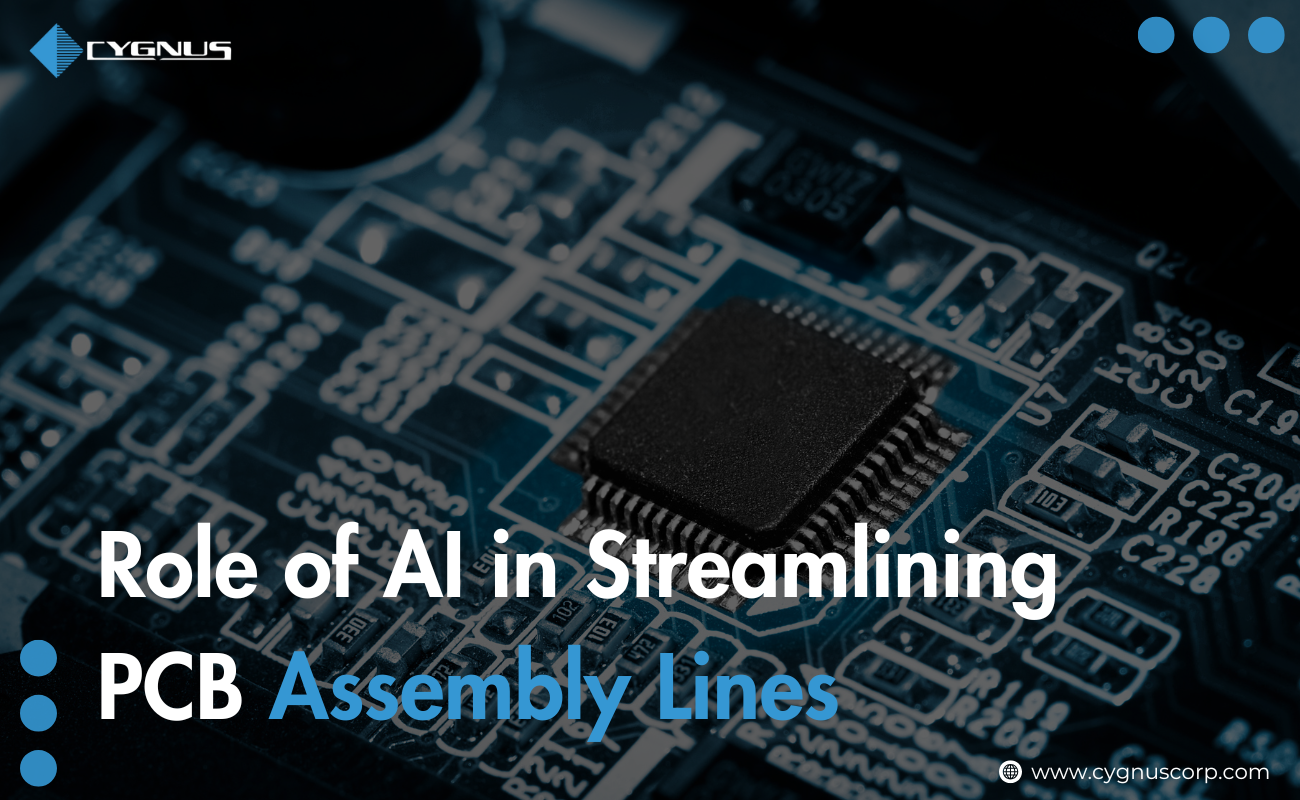In an era where precision and efficiency are not just goals but necessities, streamlining PCB assembly lines has become imperative for manufacturers aiming to stay at the forefront of technology. Artificial Intelligence (AI) is at the center of this transformation, redefining the way electronic components are assembled.
By integrating AI in streamlining PCB assembly lines, manufacturers are unlocking new levels of productivity and accuracy, setting new standards in the electronics manufacturing industry. This blog explores how AI is making these critical improvements possible, and what it means for the future of PCB assembly.
The Basics of PCB Assembly:
Printed Circuit Boards (PCBs) are the backbone of virtually every electronic device. The PCB assembly line process involves placing and soldering various electronic components onto the PCB. This process needs to be precise as the components are often tiny and the circuits complex. Traditionally, this requires significant human effort and oversight, which introduces potential for error. Streamlining PCB assembly lines not only enhances efficiency but also significantly boosts production throughput and reliability.
Also Read: Complete PCB Design Workflow
Introduction to Artificial Intelligence in Manufacturing:
Artificial Intelligence (AI) has become a pivotal force in modern manufacturing, offering unprecedented capabilities that transform traditional processes. In the context of electronic manufacturing, AI in streamlining PCB assembly lines involves deploying machine learning models and sophisticated algorithms that learn from data to optimize and automate production.
Impact of AI on PCB Assembly Efficiency:
The role of artificial intelligence in PCB assembly is transformative. AI technologies help streamline the assembly process by optimizing the path and placement of components, which reduces the assembly time and minimizes the risk of errors. For instance, AI-powered robots can precisely place components faster than human hands, and machine learning algorithms can predict and adjust the assembly process in real-time to avoid bottlenecks. This utilization of AI in streamlining PCB assembly lines not only speeds up the process but also enhances the overall yield of the production line.
AI-Driven Quality Control in PCB Assembly:
Quality control is critical in PCB manufacturing. AI-driven systems improve this by continuously learning from various data inputs—such as images from cameras inspecting the boards—to instantly detect and correct errors that a human inspector might miss. This capability is particularly crucial for ensuring the reliability of boards in sensitive applications like medical devices or aerospace technology. By integrating AI into quality control, manufacturers can maintain high standards more consistently than ever before.
Also Read: Enhancing Signal Integrity in High-Speed PCB Designs
Challenges and Considerations:
Despite its benefits, the integration of AI into PCB assembly lines comes with challenges. The initial setup and integration of AI technologies can be costly and complex, requiring significant upfront investment in both technology and training. There’s also the ongoing need to update systems and algorithms to keep pace with evolving technologies and manufacturing processes. Additionally, there is the workforce consideration, as employees must be trained to work alongside and maintain AI-driven systems.
Future Trends and Advancements:
Looking ahead, the role of artificial intelligence in PCB manufacturing is set to grow even more integral. We can anticipate more sophisticated AI systems that not only assemble and inspect but also predict equipment failures and maintenance needs. Furthermore, as AI technology evolves, its integration with other emerging technologies like the Internet of Things (IoT) and 5G could lead to even more profound changes in the PCB assembly line process, making it more connected and efficient.
Conclusion:
The impact of AI on streamlining PCB assembly lines is undeniable. It offers a significant boost in efficiency, accuracy, and reliability, which are crucial for staying competitive in the fast-paced world of electronic manufacturing. While there are challenges to face in adopting AI, the potential benefits make it a worthwhile investment for the future of PCB manufacturing. As we continue to embrace these advanced technologies, the role of artificial intelligence in PCB assembly will undoubtedly expand, leading to smarter, faster, and more reliable manufacturing processes.





38 Comments
aquasculpt
**aquasculpt**
aquasculpt is a premium fat-burning supplement meticulously formulated to accelerate your metabolism and increase your energy output.
backbiome
**backbiome**
backbiome is a naturally crafted, research-backed daily supplement formulated to gently relieve back tension and soothe sciatic discomfort.
boostaro
**boostaro**
boostaro is a specially crafted dietary supplement for men who want to elevate their overall health and vitality.
vivalis
**vivalis**
vivalis is a premium natural formula created to help men feel stronger, more energetic, and more confident every day.
glycomute
**glycomute**
glycomute is a natural nutritional formula carefully created to nurture healthy blood sugar levels and support overall metabolic performance.
aqua sculpt
**aqua sculpt**
aquasculpt is a revolutionary supplement crafted to aid weight management by naturally accelerating metabolism
hepatoburn
**hepatoburn**
hepatoburn is a high-quality, plant-forward dietary blend created to nourish liver function, encourage a healthy metabolic rhythm, and support the bodys natural fat-processing pathways.
alpha boost
**alpha boost**
alpha boost for men, feeling strong, energized, and confident is closely tied to overall quality of life. However, with age, stress, and daily demands
nervecalm
**nervecalm**
nervecalm is a high-quality nutritional supplement crafted to promote nerve wellness, ease chronic discomfort, and boost everyday vitality.
nitric boost ultra
**nitric boost ultra**
nitric boost is a daily wellness blend formulated to elevate vitality and support overall performance.
balmorex pro
**balmorex pro**
balmorex is an exceptional solution for individuals who suffer from chronic joint pain and muscle aches.
prodentim
**prodentim**
prodentim is a distinctive oral-care formula that pairs targeted probiotics with plant-based ingredients to encourage strong teeth
synadentix
**synadentix**
synadentix is a dental health supplement created to nourish and protect your teeth and gums with a targeted combination of natural ingredients
glpro
**glpro**
glpro is a natural dietary supplement designed to promote balanced blood sugar levels and curb sugar cravings.
yu sleep
**yu sleep**
yusleep is a gentle, nano-enhanced nightly blend designed to help you drift off quickly, stay asleep longer, and wake feeling clear
mind vault
**mind vault**
mindvault is a premium cognitive support formula created for adults 45+.
prostavive
**prostavive**
prostavive Maintaining prostate health is crucial for mens overall wellness, especially as they grow older.
vitrafoxin
**vitrafoxin**
vitrafoxin is a premium brain enhancement formula crafted with natural ingredients to promote clear thinking, memory retention, and long-lasting mental energy.
femipro
**femipro**
femipro is a dietary supplement developed as a natural remedy for women facing bladder control issues and seeking to improve their urinary health.
glucore
**glucore**
glucore is a nutritional supplement that is given to patients daily to assist in maintaining healthy blood sugar and metabolic rates.
vertiaid
**vertiaid**
vertiaid is a high-quality, natural formula created to support stable balance, enhance mental sharpness, and alleviate feelings of dizziness
tonic greens
**tonic greens**
tonic greens is a cutting-edge health blend made with a rich fusion of natural botanicals and superfoods, formulated to boost immune resilience and promote daily vitality.
sugarmute
**sugarmute**
sugarmute is a science-guided nutritional supplement created to help maintain balanced blood sugar while supporting steady energy and mental clarity
sleep lean
**sleep lean**
is a US-trusted, naturally focused nighttime support formula that helps your body burn fat while you rest.
prime biome
**prime biome**
The natural cycle of skin cell renewal plays a vital role in maintaining a healthy and youthful appearance by shedding old cells and generating new ones.
provadent
**provadent**
provadent is a newly launched oral health supplement that has garnered favorable feedback from both consumers and dental professionals.
gluco6
**gluco6**
gluco6 is a natural, plant-based supplement designed to help maintain healthy blood sugar levels.
oradentum
**oradentum**
oradentum is a comprehensive 21-in-1 oral care formula designed to reinforce enamel, support gum vitality, and neutralize bad breath using a fusion of nature-derived, scientifically validated compounds.
biodentex
**biodentex**
biodentex is a dentist-endorsed oral wellness blend crafted to help fortify gums, defend enamel, and keep your breath consistently fresh.
mnl63login
Trying to access MNL63 through mnl63login. Seems straightforward. Hope the site is as reliable as the login process. Ready to try my luck ! Easy mnl63login here.
ignitra
**ignitra**
ignitra is a premium, plant-based dietary supplement created to support healthy metabolism, weight management, steady energy, and balanced blood sugar as part of an overall wellness routine
finessa
**finessa**
Finessa is a natural supplement made to support healthy digestion, improve metabolism, and help you achieve a flatter belly.
neuro sharp
**neuro sharp**
neurosharp is a next-level brain and cognitive support formula created to help you stay clear-headed, improve recall, and maintain steady mental performance throughout the day.
wildgut
**wildgut**
wildgut is a precision-crafted nutritional blend designed to nurture your dogs digestive tract.
mitolyn
**mitolyn**
mitolyn is a plant-forward blend formulated to awaken metabolic efficiency and support steady, sustainable weight management.
prostadine
**prostadine**
prostadine concerns can disrupt everyday rhythm with steady discomfort, fueling frustration and a constant hunt for dependable relief.
anm"ala dig till binance
Your article helped me a lot, is there any more related content? Thanks! https://www.binance.info/ES_la/register?ref=VDVEQ78S
binance register
Can you be more specific about the content of your article? After reading it, I still have some doubts. Hope you can help me.